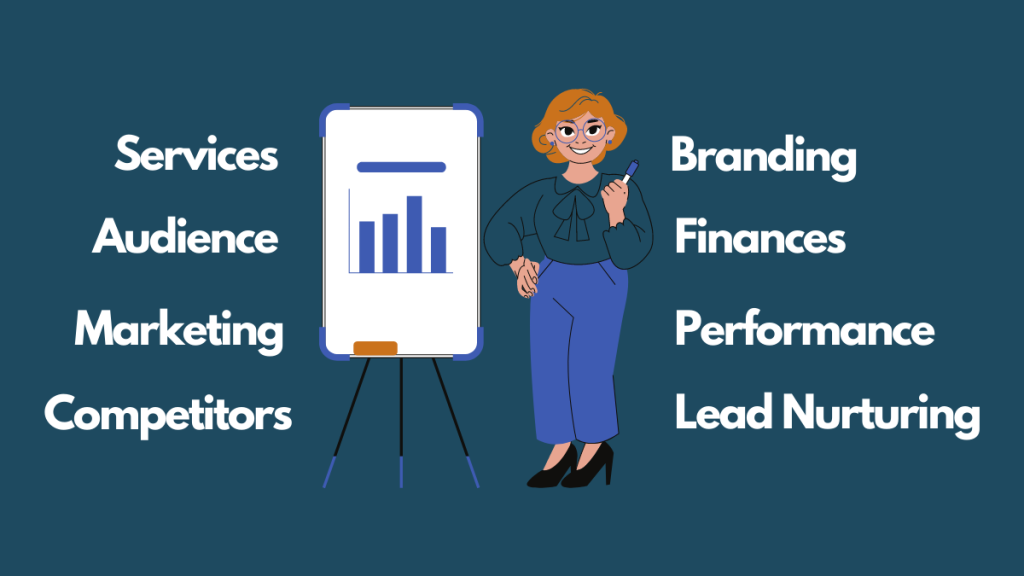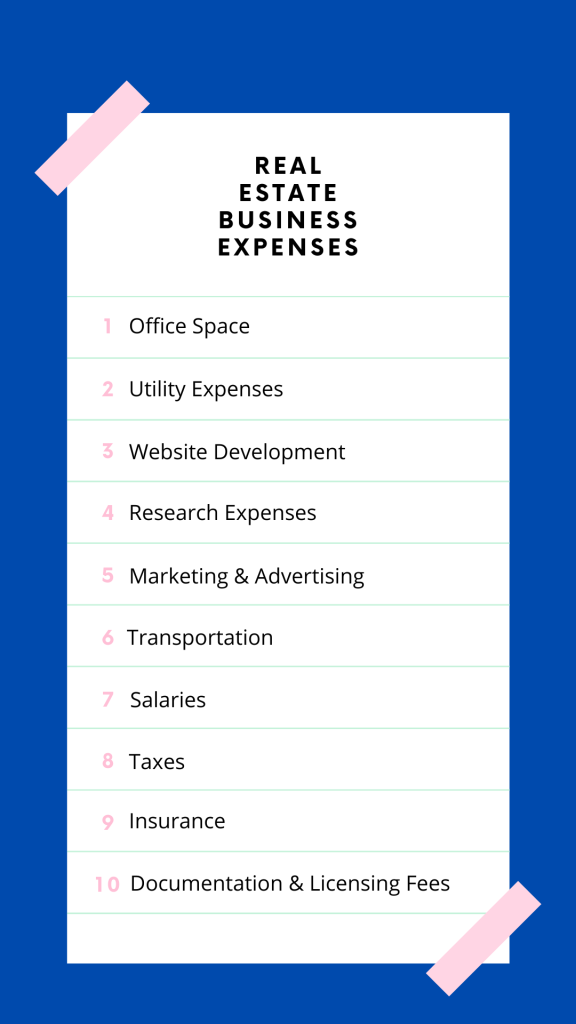
If you are reading this blog, then there’s a possibility that you are planning to start your real estate business. You must be researching about the best markets, exploring networking opportunities, reaching out to marketing and advertising agencies, and looking for ways to formulate an effective real estate agent business plan.
Well, you have come to the right place!
In order to build a profitable real estate company, you need to lay emphasis on numerous factors like budget, services to be offered, advertising platforms, brand and team building, reputation management, etc. However, the goals should be specific and achievable so that executing and measuring the performance of your plans becomes easy.
So in this blog, we will shed light on some actionable steps to cultivate a real estate business roadmap that will help you succeed!
What is a Real Estate Agent Business Plan?
A document that addresses three important questions of any new business – “What you want to do,”Why you want to do,” and “How do you plan to achieve it,” is called a business plan.
If we specifically talk about real estate agent business plan, then it will enumerate upon your niche, business goals, target audience, short- and long-term strategies, SWOT analysis, market research, funding opportunities, etc. The plan should comprehensively capture the strengths and shortcomings of your company so that you can set achievable and measurable goals.
Why do you Need a Business Plan?
A real estate agent business plan will help you identify your strengths and weaknesses, your marketing and advertising strategies, and the areas where you can establish a firm presence. It will also give you an overview of where you stand in the industry and how you can make a course correction.
Here are the other advantages of documenting your plan:
- It will help you position your brand and reposition as per the changing environment
- You will be able to understand the market and your competitors better
- You will be able to identify your audience and their needs
- You can create a finance and revenue model
- It will help you examine the feasibility of your plans
- You can document your marketing plan and look for ways to reach the audience
- Last but not least, a business plan will assist in tapping new opportunities
Always remember that research is the GPS to effective delivery. So when you have identified the issues prevalent in the real estate industry and have devised some strategies for working on the loopholes, you will be able to grow your business manifolds.
How to Make an Effective Real Estate Business Plan?
To make an effective real estate agent business plan, you need to identify the areas where you can deliver maximum results with minimum resources and areas where you may need assistance from others. You can do this by asking yourself a bunch of questions like:
- Why did you choose a specific niche?
- Who is your audience and where you can find them?
- What are the threats that can act as a hindrance?
- What are the opportunities that you can tap to grow your business?
- What is your 30:60:90 day plan and how will you measure your performance?
- How much can you spend on different tasks?
- Do you need to hire more employees? If yes, then for which department?
5 Step Real Estate Agent Business Plan
A well-structured business plan will act as your personal guide and will keep you on track of your goals. Additionally, it will help you chart a system which will make it easier for you to comprehend which strategies are generating the highest ROIs and what isn’t working. In the following paragraphs, we will share with you a 5-step guide that will help you ideate a blueprint for your real estate business.

STEP 1: Formulate a Plan
Based on your needs and requirements, your real estate agent business plan will vary. However, there are 2 things that you need to perform irrespective of the niche you choose-SWOT analysis and SMART Goals.
SWOT Analysis
The first step in creating a business plan as a real estate broker or an agent is to identify the strengths and weaknesses or the “internal factors” of your company. For example, if your competitors don’t have a strong online presence, then you can work on generating brand awareness through different online mediums.
In addition to this, you also need to evaluate the opportunities which you can tap and the threats that can hamper with your work. For example, negative reviews are one of the biggest threats to any real estate business. So you need to address the complaints and look for ways to solve the pivotal issues.
Identify SMART Goals
The next step in creating a real estate agent business plan is to set the following goals:
| Goals | What are they? | Plans |
| Specific (S) | It will be difficult to measure the performance of your plans if the goals are not defined specifically. | For example, “Sell 5 properties valued over Rs. 60 Lakhs in next few months ” is a very vague goal; however, “sell 5 properties valued over Rs. 60 Lakhs between 1st July to 31st August is more specific. |
| Measurable (M) | Goals that are assessed based on some set metrics and KPIs are referred to as measurable goals. To identify the loopholes and the areas in which you can improve, you need to come up with specific numbers. | For example, “reduce website bounce rate to 40%.” |
| Attainable (A) | Goals which are realistic and practical are attainable. | For example, “grow business by 300%” without defining how you plan to achieve it is unrealistic. However, specifying a goal like “recruit 3 professionals in January, and grow business by 150% by October sounds attainable. |
| Relevant (R) | If goals are not relevant at the present, then adding them to your plan will not be beneficial. Emphasis should be laid on those plans which have long-term effects. | For example, you have planned to recruit 4 employees in the marketing team. But if the work can be completed with 3 employees, then do you need another candidate? |
| Timely (T) | Achieving goals by a set deadline is a simple and straightforward step in cultivating a real estate agent business plan. | For example, “complete all documentations by 31st october.” |
STEP 2: Brand Building
Step number two in crafting a real estate agent business plan is to understand your audience and building a brand that resonates with their needs.
Identifying the Ideal Niche
For this, you first need to niche down to a particular category. For example, if selling commercial real estate is your forte, then you should focus on that. In addition to this, you also need to lay emphasis on the following points:
- What types of property would you want to focus on? For example, if it’s commercial, then will it be co-working spaces or retail outlets.
- Which price points are you comfortable with? Is it the mid-income group flats or luxury villas?
- Which neighborhoods are you well versed with? Is it Greater Noida or Greater Kailash?
Understanding Audience Requirements
Once you have narrowed down on your niche, the next step is to identify and understand your audeinces’ needs. This includes, but is not limited to, identifying client demographics, selecting the most suitable online and offline marketing mediums, and the challenges that you may face.
Explaining your Visions & Missions
A superbly narrated story that resonates well with your audience can be considered as a great start for your real estate company. As an agent, it’s important for you to ideate goals that are meaningful to clients.
For example, if you were born and raised in a particular area, then you must be familiar with all the important details pertaining to that location. This will make you a much more credible and informative agent in comparison to your competitors.
In addition to this, you must explain what drives you to do what you are doing. For example, if you are offering property management services, then you can enumerate the common issues faced in handling rental properties and what unique methods your company is implementing to solve these problems. Remember, the idea is to set yourself apart from your competitors. Hence, there has to be a “differentiator” in the services that you offer.
Brand Identity
Choosing the name, logo and tagline of your brand is the most creative part of writing a real estate agent business plan. Along with name, you also need to define brand tone, select color swatches, create website and social media profiles. Since the vision and mission of your brand defines your brand identity, it should be written very clearly across the platforms that you want to establish your presence on. You can read our step-by-step guide on real estate branding to understand the process in detail.
Getting Yourself Registered
With the enactment of the RERA Act, it has become mandatory for a real estate agent to register with a states’ regulatory authority. Without getting registered, you will not be able to facilitate real estate property transactions between sellers and buyers. If you sell a property without getting the necessary license, you will attract a fine of Rs 10,000 every day (during the default period) and a penalty of up to 5% of the total transaction value will also be imposed.
STEP 3: Reviewing Financials
Warren Buffet had once said – “Rule No. 1: Never lose money. Rule No. 2: Never forget rule No. 1.” And when you want to start a real estate agency, this is one formula that you need to abide by. Here are a few things that you need to consider when planning your finances:
Expenses
If your company is up and running, then you need to review your expenditures and profits from previous year. However, if you are about to foray into this sector, then you need to plan your finances in advance. This is because in addition to business expenses, there will also be many personal expenses like debt payments and insurance that you will need to handle.
Now when we come to the business-related expenses, here is where you will be required to spend money:

Calculating Income
While calculating additional and business expenses is one aspect, formulating strategies that can help you earn a good income is what you need to focus on next. For this, you need to figure out the number of houses you intend to sell and the lead count which you want to obtain from online sources.
Let us assume that the average price of a 3 BHK apartment in your locality is Rs. 50 Lakhs and the commission you’ll earn from this transaction is 2%. Then you will have to sell approximately 10 such flats to earn an income of Rs. 10 Lakhs.
Hence, you need to incorporate expenses along with savings and investments in your real estate agent business plan. Only then will you be able to calculate your yearly profits and chalk out a strategy for the next year.
Quick Tip: Most of your income will be generated from the commission that you’ll earn on conducting property sale and purchase transactions. However, you should not rely on only one income source. Perhaps, when your business starts growing, you can start offering short real estate courses or can provide consultancy services to your clients!
STEP 4: Marketing and Advertising
Now that you have figured out your finances, the next step in creating a real estate agent business plan is to formulate marketing and advertising strategies. Here, you need to build on your strengths and identify the factors that set your company apart from others. For example, if you are amongst the few who specialize in selling properties and also offering property management services, then it has to be highlighted.
Plus, with the growing penetration of the internet across tier-2 and tier-3 cities, you need to effectively utilize digital real estate tools to reach more prospects. For this, you have to work on paid (Google or social media ads), free (blog writing, content marketing) marketing tactics, and lead nurturing activities (email campaigns, cold-calling). Creating and building social media profiles, optimizing your website for search engines, video marketing, and working on online reputation management are some of the other examples.
Although the metrics and key performance indicators (KPIs) will vary from one marketing techniques to another, you need to track the performance of your campaigns on a regular basis.
STEP 5: Team Building
In your initial days, you might work with a few people. However, as your business starts to grow, hiring individuals from different backgrounds will become a necessity. The number of employees that you will recruit will also depend on the skills of your team. For example, your company may have professionals who can handle the finance part well but they may lack marketing expertise. Hence, taking on board professionals adept in the field will be an ideal choice.
The aforementioned pointers will help you in formulating a solid real estate agent business plan. While setting specific goals is one facet of creating a plan, attaining the goals timely, and measuring the performance is another. Hence, you need to lay emphasis on all the factors equally. The real estate industry of India is ever-evolving. So you need to chart short-term as well as long-term strategies to stay on track and avoid any unforeseen issues.

![Well, #GrowWithPropacity is here to educate you all about all things Real Estate.
Follow to stay updated in Real Estate!
[Real Estate, Construction, Real Estate Tips, Real Estate Growth, Real Estate Industry, Carpet Area, Super Area, Built Up Area, Home Buying Tips, Home Buyers, Property]](https://propacity.com/blogs/wp-content/plugins/instagram-feed/img/placeholder.png)
Leave a Reply